
Springtime in the Rockies is a 1937 American Western film directed by Joseph Kane and starring Gene Autry, Smiley Burnette, and Polly Rowles. Written by Gilbert Wright and Betty Burbridge, the film is about a ranch owner who brings a flock of sheep into cattle country and faces the opposition of local ranchers with the help of her ranch foreman.
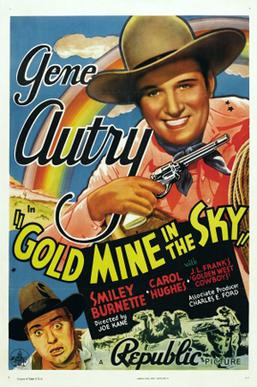
Gold Mine in the Sky is a 1938 Western film directed by Joseph Kane and starring Gene Autry, Smiley Burnette, and Carol Hughes. Based on a story by Betty Burbridge, the film is about a singing cowboy and ranch foreman who, as executor of the owner's will, must see that the daughter and heiress does not marry without his approval.
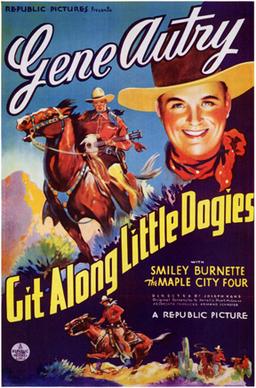
Git Along Little Dogies is a 1937 American Western film directed by Joseph Kane and starring Gene Autry, Smiley Burnette, and the Maple City Four. Written by Dorrell and Stuart E. McGowan, the film is about a singing cowboy who gets caught up in a war between oilmen and cattle ranchers, taking the side of the ranchers until he learns that oil will bring a railroad to town. The film is also known as Serenade of the West in the United Kingdom.
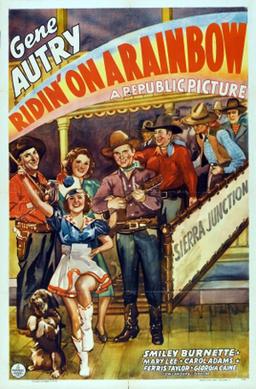
Ridin' on a Rainbow is a 1941 American Western musical film directed by Lew Landers and starring Gene Autry, Smiley Burnette, and Mary Lee. Written by Bradford Ropes and Doris Malloy, based on a story by Ropes, the film is about a singing cowboy whose investigation of a bank robbery takes him to a showboat, where he finds that a teenage singer's father has been working with the robbers to provide for her future. The film received an Academy Award nomination for best original song for "Be Honest with Me".
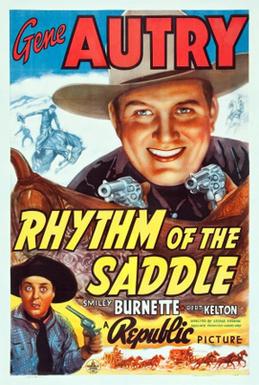
Rhythm of the Saddle is a 1938 American Western film directed by George Sherman and starring Gene Autry, Smiley Burnette, and Pert Kelton. Written by Paul Franklin, the film is about the foreman at a ranch owned by a wealthy rodeo owner who will lose her rodeo contract unless sales improve.

Home on the Prairie is a 1939 American Western film directed by Jack Townley and starring Gene Autry, Smiley Burnette, and June Storey. Written by Charles Arthur Powell and Paul Franklin, the film is about a cattle inspector's efforts to prevent a corrupt cattle rancher from shipping to market a herd of cattle infected with hoof and mouth disease.

Melody Trail is a 1935 American Western film directed by Joseph Kane and starring Gene Autry, Ann Rutherford, and Smiley Burnette. Written by Sherman L. Lowe and Betty Burbridge, the film is about a singing cowboy who goes after the men who kidnapped the baby he should have been babysitting. The film features the songs "On the Melody Trail", "A Lone Cowboy on the Lone Prairie", and "Western Lullaby".

The Singing Cowboy is a 1936 American Western film directed by Mack V. Wright and starring Gene Autry, Smiley Burnette, Lois Wilde and Lon Chaney Jr. Based on a story by Tom Gibson, the film is about a cowboy who decides to sing on television in order to raise money for the orphaned daughter of his former boss who was murdered.
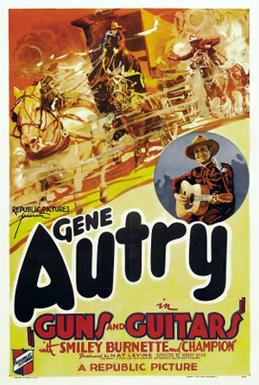
Guns and Guitars is a 1936 American Western film directed by Joseph Kane and starring Gene Autry, Smiley Burnette, and Dorothy Dix in her final film appearance. Written by Dorrell and Stuart E. McGowan, the film is about a singing cowboy who helps protect a county from fever-ridden cattle, and after being framed for murdering the sheriff, proves his innocence, gets elected sheriff, and then goes after the bad guy.

Rootin' Tootin' Rhythm is a 1937 American Western film directed by Mack V. Wright and starring Gene Autry, Smiley Burnette, and Armida. Based on a story by Johnston McCulley, the film is about two cowboys who assume the identities of dead outlaws in order to stop a bunch of cattle rustlers, later discovering that the outlaws are far from dead.
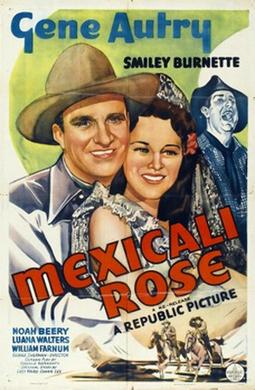
Mexicali Rose is a 1939 American Western film directed by George Sherman and starring Gene Autry, Smiley Burnette, and Noah Beery. Based on a story by Luci Ward and Connie Lee, the film is about a singing cowboy who fights corrupt oil men selling worthless stock from a non-existent well located on land belonging to a poor Mexican orphanage.
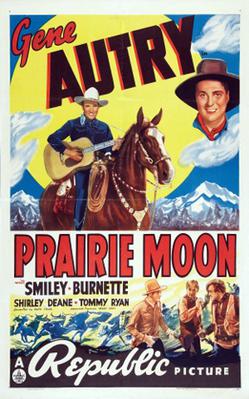
Prairie Moon is a 1938 American Western film directed by Ralph Staub and starring Gene Autry, Smiley Burnette, and Shirley Deane. Written by Betty Burbridge and Stanley Roberts, the film is about a singing cowboy who takes care of three tough boys sent west from Chicago after their father dies and leaves them a cattle ranch.

Mountain Rhythm is a 1939 American Western film directed by B. Reeves Eason and starring Gene Autry, Smiley Burnette, and June Storey. Based on a story by Connie Lee, the film is about a cowboy who organizes his fellow ranchers to oppose an Eastern promoter's land grab scheme.

Colorado Sunset is a 1939 American Western film directed by George Sherman and starring Gene Autry, Smiley Burnette, and June Storey. Written by Betty Burbridge and Stanley Roberts, based on a story by Luci Ward and Jack Natteford, the film is about a singing cowboy and his buddies who discover that the ranch they bought is really a dairy farm—and worse, it's subject to intimidation from a protection racket that prevents dairy products from safely reaching the market.

Rovin' Tumbleweeds is a 1939 American Western film directed by George Sherman and starring Gene Autry, Smiley Burnette and Mary Carlisle. Written by Betty Burbridge, Dorrell McGowan, and Stuart E. McGowan, the film is about a cowboy congressman who exposes a crooked politician who is delaying passage of a flood control bill.
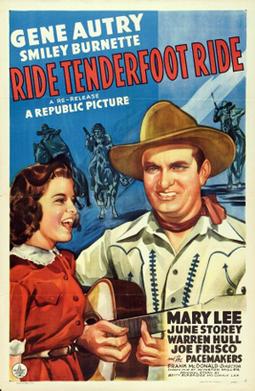
Ride, Tenderfoot, Ride is a 1940 American Western film directed by Frank McDonald and starring Gene Autry, Smiley Burnette, and June Storey. Written by Winston Miller, based on a story by Betty Burbridge and Connie Lee, the film is about a singing cowboy who inherits a meat-packing plant and must face stiff competition from a beautiful business rival.
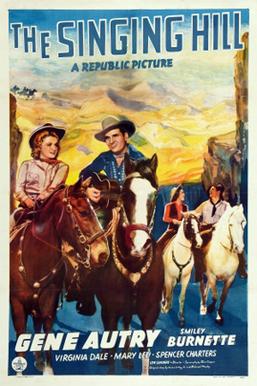
The Singing Hill is a 1941 American Western film directed by Lew Landers and starring Gene Autry, Smiley Burnette, and Virginia Dale. Based on a story by Jesse Lasky Jr. and Richard Murphy, the film is about a singing cowboy and foreman of a ranch that may be sold to an unscrupulous banker by the young madcap heiress who is unaware that the sale will result in the local ranchers losing their free grazing land and their ranches. In the film, Autry performed the 1940 song "Blueberry Hill", first recorded by Sammy Kaye, which would become a standard recorded by such artists as Louis Armstrong (1949), Fats Domino (1956), and Elvis Presley (1957). The song became one of Autry's best-selling recordings. In 1987, "Blueberry Hill" received an ASCAP Award for Most Performed Feature Film Standards on TV.

Back in the Saddle is a 1941 American Western film directed by Lew Landers and starring Gene Autry, Smiley Burnette, and Mary Lee. Written by Richard Murphy and Jesse Lasky Jr., the film is about a singing cowboy who attempts to bring peace between ranchers and the operator of a copper mine whose chemicals are poisoning the area's water supply. The film features several of Autry's hit songs, including "Back in the Saddle Again", "I'm An Old Cowhand", and "You Are My Sunshine".

Call of the Canyon is a 1942 American Western film directed by Joseph Santley and starring Gene Autry, Smiley Burnette, the Sons of the Pioneers, and Ruth Terry. Based on a story by Maurice Rapf and Olive Cooper, the film is about a singing cowboy who leads a group of cattlemen against the corrupt agent of a large packing company looking to swindle them by undercutting the buying price for beef. The film features three songs by Autry and the Sons of the Pioneers, including the classic "Take Me Back to My Boots and Saddle".

Sierra Sue is a 1941 American Western film directed by William Morgan and starring Gene Autry, Smiley Burnette, and Fay McKenzie. Written by Earl Felton and Julian Zimet, the film is about a government inspector investigating a poisonous weed that is destroying the rangeland supporting the area's cattle. The inspector must persuade the ranchers to reject a plan to burn the land and support a new process of chemical spraying from an airplane. The film features the popular Autry songs "Be Honest With Me", "Ridin' the Range", and the title track.




















